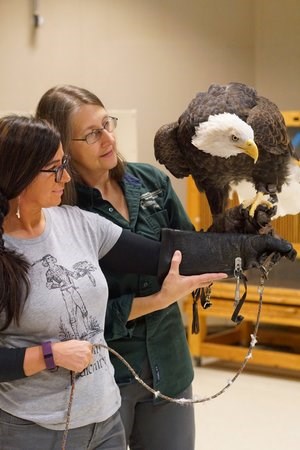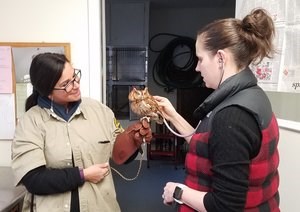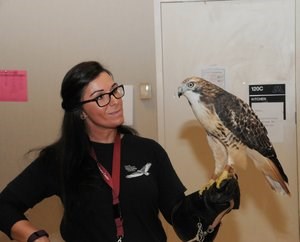Adventures and Advancements in Captive Raptor Management
Posted on in On the Mountain by Rachel Spagnola, Senior Educator

Earlier this season, I had the incredible opportunity to attend The University of Minnesota’s 2017 Care and Management of Captive Raptors four-day comprehensive workshop from October 13-20, funded by a Philadelphia Foundation grant. With over 20 years of “talons-on” experience working with raptors in captivity, I have returned to Hawk Mountain Sanctuary from The Raptor Center (TRC) with a renewed sense of empowerment and motivation to propel our captive management practices to a world class status.
Prior to handling and training birds at the TRC, I successfully completed hands-on medical exams and necropsy under the direction of expert clinic staff. Although far from being Dr. Dolittle, after learning the best practices in diets, nutrition, equipment, and raptor housing, I am eager to implement modifications to provide the highest quality of life for my feathered coworkers.

Hawk Mountain Sanctuary’s Education Department is responsible for a collection of birds that require care and maintenance 365 days a year. In my role as senior educator and lead raptor care manager, I schedule, train, and supervise volunteers ensuring best practices and the safety of volunteers and birds. With the support of my education teammates Erin Brown and Adam Carter, I created a vetting process for volunteers to ensure consistency and high standards of care. Unable to send a text message or call staff when they are ill, we are responsible for feeding, cleaning, conducting routine health checks for the birds year-round. We take this responsibility seriously 24 hours a day, 7 days a week, monitoring bird welfare through polar vortex temperatures, mosquito-breeding season, and beyond. Attending the TRC workshop fostered my deeper appreciation for the role of avian educators as ambassadors for raptor conservation.
We also manage on-going training and enrichment for both the birds and volunteers throughout their tenure, aiming to provide a stress-free environment for our avian educators throughout their lifespan. Although young at heart, several members of our avian education team are entering their “golden years” and have geriatric needs. The HMS avian educators have individual special needs in addition to the natural history requirements of each species.

In recent years, I developed a Raptor Care Advisory Committee consisting of an avian veterinarian, raptor rehabilitator, and professional bird trainer who share their unique knowledge, specialized skills, and experience to meet the needs of our captive raptor management plan. With the guidance of the International Association of Avian Trainers and Educators (IAATE), I’ve created a collection plan, training and enrichment plans, and a retirement position statement to ensure consistency and adherence to our mission of serving as a model facility.
Although the Pennsylvania Game Commission and the United States Fish and Wildlife Service require annual audits of Hawk Mountain Sanctuary’s collection of captive birds, we also undergo a yearly voluntary audit by an outside source. Most recently, my ultimate raptor conservation hero, (after Rosalie Edge, Maurice and Irma Broun, of course), Director of the International Centre for Birds of Prey, Jemima Parry-Jones conducted a thorough exam of all birds and an audit of our enclosures and indoor raptor care facilities.
I owe a debt of gratitude to Hawk Mountain Sanctuary’s team of volunteers, advisors, staff, and mentors who continue to support me. When you visit the Sanctuary and enjoy a live raptor program, ‘Raptors Up Close’ or meet one of our ambassadors at a festival or large event, please know that your support makes a positive impact!